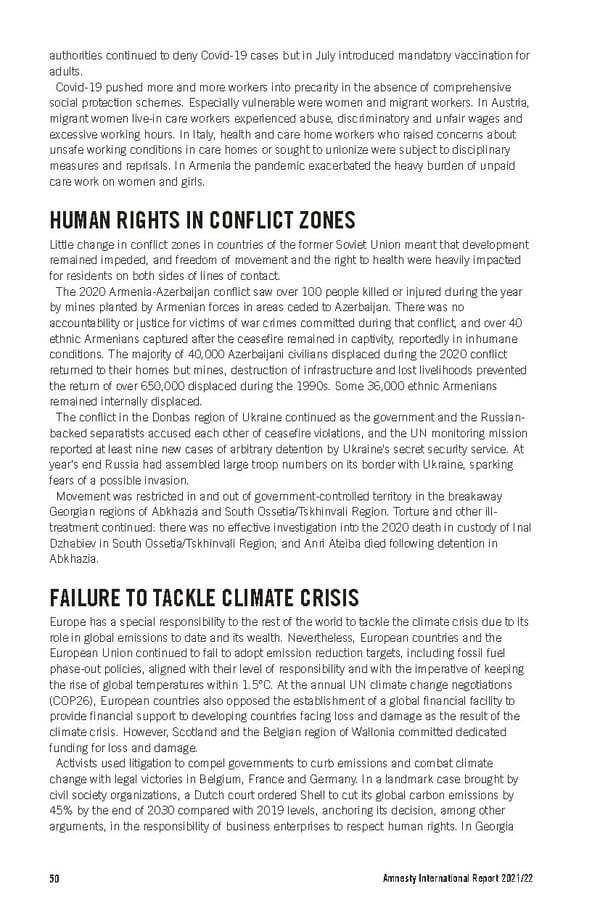authorities continued to deny Covid-19 cases but in July introduced mandatory vaccination for adults. Covid-19 pushed more and more workers into precarity in the absence of comprehensive social protection schemes. Especially vulnerable were women and migrant workers. In Austria, migrant women live-in care workers experienced abuse, discriminatory and unfair wages and excessive working hours. In Italy, health and care home workers who raised concerns about unsafe working conditions in care homes or sought to unionize were subject to disciplinary measures and reprisals. In Armenia the pandemic exacerbated the heavy burden of unpaid care work on women and girls. HUMAN RIGHTS IN CONFLICT ZONES Little change in conflict zones in countries of the former Soviet Union meant that development remained impeded, and freedom of movement and the right to health were heavily impacted for residents on both sides of lines of contact. The 2020 Armenia-Azerbaijan conflict saw over 100 people killed or injured during the year by mines planted by Armenian forces in areas ceded to Azerbaijan. There was no accountability or justice for victims of war crimes committed during that conflict, and over 40 ethnic Armenians captured after the ceasefire remained in captivity, reportedly in inhumane conditions. The majority of 40,000 Azerbaijani civilians displaced during the 2020 conflict returned to their homes but mines, destruction of infrastructure and lost livelihoods prevented the return of over 650,000 displaced during the 1990s. Some 36,000 ethnic Armenians remained internally displaced. The conflict in the Donbas region of Ukraine continued as the government and the Russian- backed separatists accused each other of ceasefire violations, and the UN monitoring mission reported at least nine new cases of arbitrary detention by Ukraine’s secret security service. At year’s end Russia had assembled large troop numbers on its border with Ukraine, sparking fears of a possible invasion. Movement was restricted in and out of government-controlled territory in the breakaway Georgian regions of Abkhazia and South Ossetia/Tskhinvali Region. Torture and other ill- treatment continued: there was no effective investigation into the 2020 death in custody of Inal Dzhabiev in South Ossetia/Tskhinvali Region; and Anri Ateiba died following detention in Abkhazia. FAILURE TO TACKLE CLIMATE CRISIS Europe has a special responsibility to the rest of the world to tackle the climate crisis due to its role in global emissions to date and its wealth. Nevertheless, European countries and the European Union continued to fail to adopt emission reduction targets, including fossil fuel phase-out policies, aligned with their level of responsibility and with the imperative of keeping the rise of global temperatures within 1.5°C. At the annual UN climate change negotiations (COP26), European countries also opposed the establishment of a global financial facility to provide financial support to developing countries facing loss and damage as the result of the climate crisis. However, Scotland and the Belgian region of Wallonia committed dedicated funding for loss and damage. Activists used litigation to compel governments to curb emissions and combat climate change with legal victories in Belgium, France and Germany. In a landmark case brought by civil society organizations, a Dutch court ordered Shell to cut its global carbon emissions by 45% by the end of 2030 compared with 2019 levels, anchoring its decision, among other arguments, in the responsibility of business enterprises to respect human rights. In Georgia Amnesty International Report 2021/22 50
 Amnesty International Report 2021/22 Page 49 Page 51
Amnesty International Report 2021/22 Page 49 Page 51